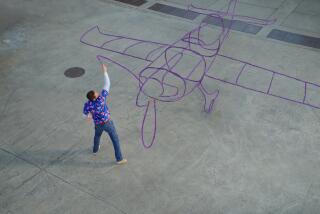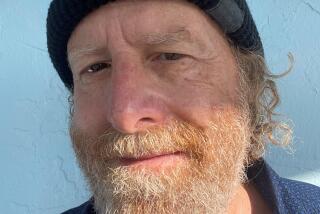A Comedy of Life and Death : Young Rebels Love ‘Harold and Maude’
- Share via
Harold is the prince of oddballs in Hal Ashby’s “Harold and Maude.” He drives a hearse, visits funerals as if they’re lawn parties and stages his suicide with the concentration of a Noh performer.
When not indulging his death thing, Harold, barely out of his teens, dreams of marrying Maude, a 79-year-old Holocaust survivor with a superhuman yen for life.
Bud Cort plays Harold as if he’s a confused iconoclast, making an instinctual statement against a world far too unbending to be endured. He looks weird and acts weird, but he’s true to himself.
Director Ashby and Cort gave us a real antihero for a generation excited by antiheroes. “Harold and Maude,” which came out in 1971 to tepid reviews, became a cult hit almost immediately, especially in art houses and on campuses.
Some people still get a glow when they talk about this movie, as if they’re remembering a favorite childhood moment. It made folks feel good (obviously, still does). Harold turned strangeness into something virtuous, almost sublime; besides, any strange person knew he could never be as strange as Harold. That must have been a relief.
Besides trumpeting individualism and hippie good vibes, “Harold and Maude”--which screens Friday night as part of UC Irvine’s “Love the Whole World Round” series--is juicy with broadsides against the military, psychotherapy, organized religion and social hypocrisy in general. It’s a movie for lighthearted rebels, especially young ones.
Unfortunately, Cort’s performance can be a little too cute. Ruth Gordon (she plays Maude) is a lot too cute, and Ashby’s overall style as much slapdash as slap-happy.
The film works best on first viewing; Ashby puts everything on the surface in high relief, and, unlike the really great films, there aren’t many subtleties to plumb later. Ashby’s approach is wild and woolly, much more so than in such later efforts as “Shampoo,” “The Last Detail” and “Coming Home.”
Ashby certainly has a wild and woolly character in Harold. He’s a wealthy kid with a dithering mother (Vivian Pickles) and a lot of time on his hands. His “suicides” are supposed to rattle his mother, but she is unfazed by all the acting-out.
Harold has to take his impulsiveness outside the mansion, which is where he meets up with Maude--at a funeral, of course.
Their love affair swells slowly in the foreground, with curious other encounters happening on the sides. Harold has run-ins with the police, a cartoonish Freudian psychiatrist, a dim priest and Uncle Victor (Charles Tyner), an Army officer said to have been Gen. MacArthur’s “right-hand man.”
We get the joke later, when Uncle Victor salutes during a rather famous, especially ribald scene. In place of a right arm, he has an elaborate prosthetic that performs the crispest of military salutes. That gag pretty much sums up the tone of “Harold and Maude,” although Ashby’s movie does reach for sentimentality as well.
The humor is softer and the pathos more tender when Harold and Maude are together. Ashby backs off to present his primary message, that love, for both life and each other, is the main thing. Ashby says be true to that, and you will do all right, just like Harold.
More to Read
Only good movies
Get the Indie Focus newsletter, Mark Olsen's weekly guide to the world of cinema.
You may occasionally receive promotional content from the Los Angeles Times.










